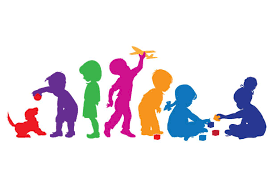
Balvatika” is a term commonly used in India, specifically in the Gujarati language, to refer to a children’s park or playground. The word “bal” means “child” or “children” in Gujarati, and “vatika” means “garden” or “park.” Best Preschool Balvatika Activites Materials.
🌱🌱🌱🌱🌱🌱🌱🌱🌱🌱🌱🌱🌱🌱🌱
Balvatikas are designed to provide recreational and play areas for children. They often include various amenities and facilities such as swings, slides, see-saws, merry-go-rounds, climbing structures, sandboxes, and open spaces for running and playing. Balvatikas are usually vibrant and colorful, with a focus on creating a safe and enjoyable environment for children to engage in physical activities and socialize with their peers.
🌌🌌🌌🌌🌌🌌🌌🌌🌌🌌🌌🌌🌌🌌🌌
These parks are commonly found in cities, towns, and residential areas across Gujarat and other parts of India. They serve as popular gathering spots for families and provide a space for children to have fun, exercise, and develop their motor skills while enjoying outdoor activities. Balvatikas play an essential role in promoting physical and mental well-being among children and fostering a sense of community within neighborhoods.
🌨️🌨️🌨️🌨️🌨️🌨️🌨️🌨️🌨️🌨️🌨️🌨️🌨️🌨️🌨️
Balvatika is known for its interactive and educational activities designed for children. It often offers a variety of play areas, including outdoor playgrounds, indoor play zones, and interactive exhibits. The facility aims to provide a fun and engaging environment where children can learn and develop various skills while enjoying themselves.
🌠🌠🌠🌠🌠🌠🌠🌠🌠🌠🌠🌠🌠🌠🌠
Best Preschool Balvatika Activites Materials

Preschool education plays a crucial role in a child’s development and lays the foundation for their future learning and success.
🌴🌴🌴🌴🌴🌴🌴🌴🌴🌴🌴🌴🌴🌴🌴
Here are some important aspects and benefits of preschool education:
Importanat of Preschool education
🌿🌿🌿🌿🌿🌿🌿🌿🌿🌿🌿🌿🌿🌿🌿
Social and Emotional Development: Preschool provides children with opportunities to interact with their peers, teachers, and other adults. They learn essential social skills such as sharing, taking turns, cooperating, and resolving conflicts. Preschool also helps children develop self-confidence, independence, and emotional resilience.
Cognitive Development: Preschool introduces children to basic academic concepts such as numbers, letters, colors, and shapes through age-appropriate activities and play. They develop early literacy and numeracy skills, problem-solving abilities, critical thinking, and creativity. Preschool education fosters curiosity, exploration, and a love for learning.
🫥🫥🫥🫥🫥🫥🫥🫥🫥🫥🫥🫥🫥🫥🫥
Language and Communication Skills: Preschool offers an environment where children can enhance their language skills. They learn to communicate effectively, expand their vocabulary, and improve their listening and speaking abilities. Preschool activities, such as storytelling, singing, and group discussions, contribute to language development.
Motor Skills Development: Preschool provides various physical activities that help children develop their fine and gross motor skills. They engage in tasks like drawing, cutting, pasting, building blocks, and outdoor play, which promote hand-eye coordination, balance, strength, and overall physical development.
💫💫💫💫💫💫💫💫💫💫💫💫💫💫💫
Preparation for Formal Education: Preschool acts as a bridge between home and formal schooling. It helps children adjust to a structured learning environment, follow routines, and develop essential school readiness skills. They learn classroom etiquette, listening skills, following instructions, and develop the ability to focus and concentrate.
✍️✍️✍️✍️✍️✍️✍️✍️✍️✍️✍️✍️✍️✍️✍️
Socialization and Cultural Awareness: Preschool exposes children to diverse experiences, cultures, and perspectives. They learn to appreciate and respect differences, develop empathy, and build positive relationships with others. Preschool helps in fostering a sense of belonging and being part of a community.
💮💮💮💮💮💮💮💮💮💮💮💮💮💮💮
Early Identification of Developmental Delays: Preschool teachers and staff are trained to observe children’s development closely. They can identify any potential developmental delays or learning difficulties at an early stage. Early intervention can then be provided to address these challenges and provide appropriate support.
☄️☄️☄️☄️☄️☄️☄️☄️☄️☄️☄️☄️☄️☄️☄️
October સપ્તાહ 1 ,2 આયોજન
December સપ્તાહિક આયોજન
January સપ્તાહિક આયોજન
February સાપ્તાહિક આયોજન
March સાપ્તાહિક આયોજન
મુલ્યાંકન
પ્રેકટીસ પેપર DOWNLOAD ગણિત
વાર્ષિક પરીક્ષા
બાલવાટીકા ગણિત પેપર pdf
બાલવાટીકા ગુજરાતી પેપર pdf
બાલવાટિકા મૂલ્યાંકન Excel File
બાલવાટિકા IL Sheet pdf
બાલવાટિકા EC Sheet pdf
બાલવાટિકા HW Sheet pdf
🌀🌀🌀🌀🌀🌀🌀🌀🌀🌀🌀🌀🌀🌀🌀
